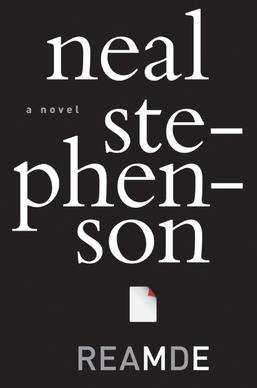It has been a while since I have read a Stephenson novel, so when I saw this 1044 pages of light reading on the library shelf, I thought I would give it a go.
While I still enjoyed this novel, overall it was one of my least favourite Stephenson novels that I have read. I think perhaps the type of novel this was - essentially a thriller set in basically our current world - showcased Stephenson's weaknesses and hid his strengths, as a writer.
Stephenson is pretty famous for writing giant novels, and this is no exception. However usually it feels like a lot more is going on to justify the length. In this novel, the plot seems much more straight forward, and instead of using the pages to explain complex concepts or explore the world, we instead get 150 page long car/boat chases.
I think fundamentally the reason why Neal Stephenson novels are usually really fun, is their setting. He essentially writes novels set in various nerd utopias. The difference between him and most other science fiction writers writing in utopia settings, is most of those types of novels spend a lot of time arguing for the utopia or telling you how good it is. In Neal Stephenson novels, there is less of that, and the novel is more just set there. We might see how much a character likes the setting through their eyes, and how excited they are by it, but it still seems less directly aimed at the reader. I think this eases suspension of disbelief, because it feels less preachy and allows one to get absorbed in the "coolness" of the fantasy without thinking about all the ways it falls apart. For example, both Ananthem and The Big U are romanticized versions of university life (albeit romanticized in opposite directions), Cryptonomicon is a romanticized version of the cypherpunk movement, Snow crash is kind of romanticized cyberpunk. [I read these a long time ago, I might not be remembering them that well]
In this novel, the only romanticized aspect, is a world where everyone thinks MMORPGs are really cool. Unfortunately, a world where slightly more people play MMORPGs, is a lame utopia.
Additionally it has very little to do with the plot. It does provide the inciting incident, where a ransomware computer virus infecting the MMORPG encrypts some mobsters' private files. However this felt arbitrary - the MMORPG aspect really didn't matter.
Even worse, we spend hundreds of pages on this MMORPG world and the ongoing re-alignment of the in-world factions (The so-called "War of realignment"). Just as it seems to be building to something, we cut away to the main plot, never bothering to resolve or revisit what was building. This is especially sad, because in a lot of ways, it was more interesting than the main plot. Instead it is relegated to being a rather trite metaphor for a theme in the main plot about people coming together to form a chosen tribe over whatever situations they were born into.
Perhaps that's the biggest disappointment in this book: The threads don't really come together to form something bigger. There are a bunch of interesting premises at various points that don't really seem to contribute much to the overall whole. There is the design of the MMORPG/War-of-realignment, which is talked about a lot, but doesn't really go anywhere. There are the motorcycle gangsters with katanas, which are introduced as a back-story for a side character, who just ends up being shot with no katana fights. There are the main character's relatives who are some sort of fundamentalist christian gun-nut cult, but when the action comes down they mostly just hide in their house like normal people.
Why bother with all these tantalizing details when everyone in the end just acts like a normal person. Their uniqueness seems unnecessary to the novel, which feels like a major let down.
Last of all and pretty unrelatedly, the female characters felt like they were written weirdly, in a hard to define way. The main character, Zula, spent most of the novel kidnapped, and there was a bizarre amount of discussion on the differing levels of chivalry her various kidnappers showed her. As if holding the door open for her somehow makes up for the whole kidnapping at gunpoint. Several characters debate whether Yuxia is a "sister" or girlfriend material, where "friend" or "person they just met last week under very traumatic circumstances" apparently didn't cross anyone's mind. All the romantic pairings seemed kind of random and forced (Except maybe Olivia & Sokolov). Yuxia had barely even exchanged any words with Seamus before suddenly being together. Csongor and Zula also had pretty limited interaction before falling in love.
In the end, i did enjoy it, but definitely not his strongest novel.

No comments:
Post a Comment